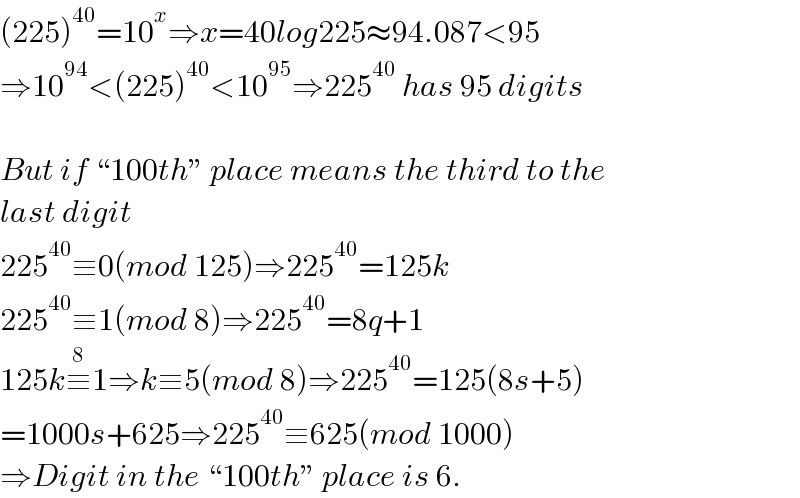Question Number 206805 by BaliramKumar last updated on 26/Apr/24

Answered by A5T last updated on 26/Apr/24

$$\left(\mathrm{225}\right)^{\mathrm{40}} =\mathrm{10}^{{x}} \Rightarrow{x}=\mathrm{40}{log}\mathrm{225}\approx\mathrm{94}.\mathrm{087}<\mathrm{95} \\ $$$$\Rightarrow\mathrm{10}^{\mathrm{94}} <\left(\mathrm{225}\right)^{\mathrm{40}} <\mathrm{10}^{\mathrm{95}} \Rightarrow\mathrm{225}^{\mathrm{40}} \:{has}\:\mathrm{95}\:{digits} \\ $$$$ \\ $$$${But}\:{if}\:“\mathrm{100}{th}''\:{place}\:{means}\:{the}\:{third}\:{to}\:{the} \\ $$$${last}\:{digit} \\ $$$$\mathrm{225}^{\mathrm{40}} \equiv\mathrm{0}\left({mod}\:\mathrm{125}\right)\Rightarrow\mathrm{225}^{\mathrm{40}} =\mathrm{125}{k} \\ $$$$\mathrm{225}^{\mathrm{40}} \equiv\mathrm{1}\left({mod}\:\mathrm{8}\right)\Rightarrow\mathrm{225}^{\mathrm{40}} =\mathrm{8}{q}+\mathrm{1} \\ $$$$\mathrm{125}{k}\overset{\mathrm{8}} {\equiv}\mathrm{1}\Rightarrow{k}\equiv\mathrm{5}\left({mod}\:\mathrm{8}\right)\Rightarrow\mathrm{225}^{\mathrm{40}} =\mathrm{125}\left(\mathrm{8}{s}+\mathrm{5}\right) \\ $$$$=\mathrm{1000}{s}+\mathrm{625}\Rightarrow\mathrm{225}^{\mathrm{40}} \equiv\mathrm{625}\left({mod}\:\mathrm{1000}\right) \\ $$$$\Rightarrow{Digit}\:{in}\:{the}\:“\mathrm{100}{th}''\:{place}\:{is}\:\mathrm{6}. \\ $$
Answered by A5T last updated on 26/Apr/24

$$\mathrm{17}.\:\:\:\:\mathrm{2}^{{b}} \equiv\mathrm{2},\mathrm{4},−\mathrm{2},−\mathrm{4}\:\left({mod}\:\mathrm{10}\right) \\ $$$$\mathrm{3}^{{c}} \equiv\mathrm{3},−\mathrm{1},−\mathrm{3},\mathrm{1},\:\left({mod}\:\mathrm{10}\right) \\ $$$$\mathrm{4}^{{d}} \equiv\mathrm{4},−\mathrm{4}\:\left({mod}\:\mathrm{10}\right) \\ $$$$\Rightarrow\mathrm{1}+\mathrm{2}^{{b}} +\mathrm{3}^{{c}} +\mathrm{4}^{{d}} \equiv\mathrm{0},\mathrm{6},\mathrm{4},\mathrm{8},\mathrm{2}\left({mod}\:\mathrm{10}\right) \\ $$$$\Rightarrow\left({c}\right) \\ $$
